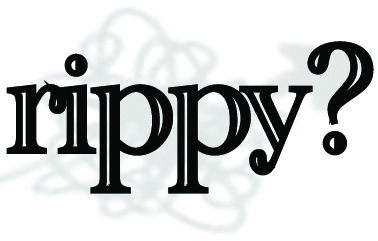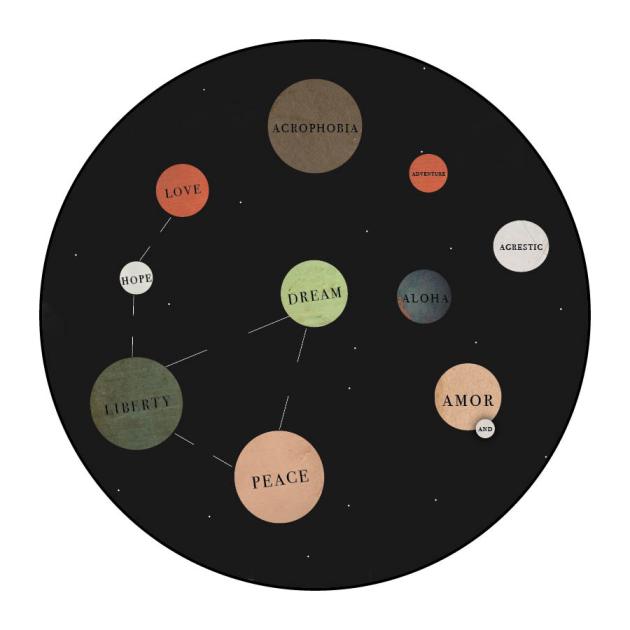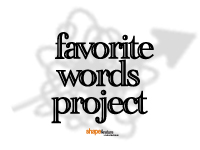Shape&Nature
A Creative Projects Press
A Universe of Words: A Note on Process
Posted by on February 18, 2015
The problem of collecting people’s favorite words, hundreds of them from all over the planet, is what to do with them afterward. How do you untangle and honor a network of meaningful, yet disparate, shouts into the night?
During our year of collecting, we received the words daily through email, catching them like baseballs from unknown throwers. Perhaps it was because of this that we first imagined a research book, something to answer the questions we were asking ourselves everyday: who sent me this word, where does she come from, what does he love? We pictured a sociological investigation where we would act as scientists who studied, examined, made hypotheses, and ran experiments to see what made which words important to which people and why.
But as we got into it, we realized we were not scientists, we were writers. To treat language like a mouse in a lab would be like taking our babies out in the snow to see if they would freeze.
So, we thought again. How about a book of words and their definitions, or a book of words accompanied with illustrations, or a book where people could use the words in writing prompts, or a book of short stories where authors were tasked with using a handful of the words? The possibilities were certainly there, but every time we walked up a new path, we’d soon realize something was missing. So, we sat on it like a dull egg. We went on to other projects and checked back in every few months. Sometimes, we even abandoned it and then felt guilty when we remembered again.
Maybe the time of incubation was what we needed because, in the meantime, our little press grew. We took on new editors, a designer, we published our first book of poetry, and started the Flaneur Walks Pamphlet series with success.
Last fall, we looked back in at our list of over 800 words again. But this time, we gazed upon the project with fresh eyes, and we realized just because we were publishers didn’t mean we had to make a book. We could make whatever we wanted. So, we hired our designer, meg willing, to solve the problem in a different way. We asked her to make a piece of art—specifically one that honored the words and their human partners while echoing the amazing experience of receiving the words—the wonder they evoked and the story they told. Here is how she did it.
+ + +
book bo͝ok/ noun: a written or printed work consisting of pages glued or sewn together along one side and bound in covers
That was the problem: the binding. The glue and the stitching held on too tightly. The gutter of the book became a chasm, hiding each page from the other. Each word spun in its own private orbit, alone.
post·er ˈpōstər/ noun: a large printed picture, notice, or advertisement meant for display
What if we could experience all the words at once? What if the expanse of a poster allowed viewers to appreciate the panoramic scope of the project, while also offering the space to sit with individual words? What if this simple design choice could set a universe of language in motion—each word a singular force, each influencing the other, each pushed and pulled by their own specific gravity?
+ + +
Our vision was renewed. The idea of placing the words on a single plane mimicked the experience of receiving submissions, creating an environment where seemingly dissimilar words could mingle and spark dialogue.
With the format decided upon, I set about the task of design. I laid out all the known pieces—the elements crucial to creating a fully-realized incarnation of The Favorite Words Project. My goals were clear:
- To present each word enticingly (and legibly)
- To design something alluring that people would want on their living room walls
- To highlight both the unique words and the personalities of our submitters
This was no small task. I brainstormed for weeks. I researched text-centric poster design. I studied patterns. I studied artists. Hell, I made a Pinterest board. I drafted ideas. I had epiphanies. Collage! Each word written over a person’s face! Each figure radiating from a central point! I discarded ideas. I grappled with space constraints, with how to represent words that were submitted more than once. We expanded one poster to a triptych. I went back to the drawing board. I tapped my pencil on my desk and thought.
(I am large, I contain multitudes.)
Whitman kept whispering in my ear. I closed my eyes. I saw a type of word universe in microcosm, existing within us all. I went for a walk. I looked up at the night sky. I pointed to Orion. The seed was planted.
+ + +
Each word would be its own planet-star existing in space. Repeating words connected by dashed lines would form constellations. These word constellations would become a kind of cultural signpost—the words we gaze to for comfort, the words that collectively guide us. On the grounding horizon of each panel clusters a society of word-gazers, reminding us that each word was born of a person’s imagination. On the central panel, a tight square of poetic text containing the Favorite Words Manifesto, this genesis:
Prayer flags sending words over the wind like pollen. Where will the word drop? What grows from the word?
A Word by Any Other Name…
Posted by on May 28, 2011
Ok, so what IS a word? We’d love to hear what you think. At the end of this blog we list some of our newest words for you to vote on.
For us as editors, we’ve been debating what a word is ever since we set the Favorite Words project in motion. Does anything go? Should we accept “aekfafaerf” —a random hit on my keyboard—for example, if someone sent it to us? Or should we be proper and only take words that appear in the Unabridged Oxford Universal Dictionary? At first we accepted almost anything, but that was before we got deluged with words and requests for bumper stickers. So we started to rethink just what it was we were trying to do.
Some of things we decided were:
o a word means a single word, not a phrase
o no names of people, organizations, businesses, or places
o no brand names or trademarks
o no words run together unless commonly accepted
o no made-up words unless commonly accepted
We don’t have anything against people’s names or the names of places, but we felt proper names were too easy. It’s easy to love your own name, or your family name or beloved’s name, the name of your dog, or your favorite place to visit. It’s easy to have a bumper sticker with your favorite political candidate on it, or your favorite product or your favorite organization. But as a creative projects press, we want to go beyond that. We want a glimpse of how people use words, and what the words say about them, what the words say to the people who hear them or see them, and what the words say about society.
To do that, we needed words that communicate something. And in that regard, we have been overwhelmed— from established old words such as “monocle,” “prestidigitation,” and “cornucopia” to evolving terms that we had never heard of (“nerdalicious,” “fucktard,” “furkids,” “shoople”). Ok, we see these terms on the web, in the Urban Dictionary, or our kids use them. Or they are brand names, like “smoothietastic,” that have started to move into the common language. On that basis, we accept them because they are being used by at least some group of people to communicate. We have accepted VERY long words: “Floccinaucinihilipilification,” for example, which we had to use two bumper stickers for; and “hippopotomonstrosesquipedaliophobia,” (fear of long words!!) which we might need three bumper stickers for. We have accepted names that exist in their own right as words: Frank, Jesus, Chargers. We also accept foreign words as long as they fit the same criteria. So we regretfully refused the Russian version of “Maria” because it is a name, even though we would love to print a Russian word on a bumper sticker!
The hardest decisions have been around made-up and run-together words. So…. is “audiomind” a word? The donor of “audiomind” insists yes; we said no. While “furkids” is also a run-together word, it appears on the web in common usage, so we accepted it. So then what about “hotsauce,” which as far as we know is two words, not one; we see it on the web as one word only as a brand name. What about “oshay,” a variant on “okay” used between a particular husband and wife, but does not seem to be used by anyone else? What about “Changuiro”— a Spanish fusion of two words translating as “hairy” and “monkey”—the donor’s pet nickname when she was a child? Or how about “llama,llama,duck”? (We said no, but we certainly would take “llama” or “duck” by themselves.) Or “soflynmythirties”? We said no.
We have learned a lot from all the words that have poured in, and are grateful for the education that our contributors are giving us. What seems like a simple task is not so simple.
So what do you think? Here are some of our newest words. Should we take them? Why or why not?
o uberiffic
o rock’n’roll
o RIPPY
o Alpha Omega
o memoo (this is young child’s made up word)
o RememberWhen
Spurious meets Flexibility – Juniper Literary Festival
Posted by on April 28, 2011
This April, we took the Favorite Words Project to the Juniper Literary Festival at the University of Massachusetts, where we introduced it to a crowd of writers and book makers.
The festival was nice, a quaint collection of local and national small presses showing off their books in the bright open space inside the fine arts center. The curators of this gathering were really generous when it came to our need for room for a printer and enough space to make the custom made iron-on t-shirts, though they seemed a little suspect of what were actually doing. I don’t blame them. There we were, among some of the most beautifully made books in the country written by extremely talented poets and writers, asking people their favorite words and printing out bumper stickers. Regardless, the response to the project was good. Mostly because people had favorite words to share and they were happy to share them.
Since it was a gathering, we thought we’d give out name tags with people’s words on them in addition to the bumper stickers and author certification cards so we could create a conversation piece between festival-goers as they made their way around the book tables. I was especially taken with how the name tags allowed people to know each other not through their real names, but through their favorite words, and how unlikely pairings of people and words made for its own kind of poetry. Here’s my favorite: Spurious meets Flexibility.
Spurious looked to be in his early fifties, a yellow haired guy with a cigarette tucked behind his ear wearing an over sized-tweed jacket. He came to our table kind of sideways, as many people did, wondering what we were doing and if there was a catch. Though, after hearing our little spiel, he brightened up and began thinking out loud about his favorite words. He had an enviable vocabulary and broke out some words I had never heard of, beautiful words charged with a potency only he could give them. I imagined him smoking non-stop in a small apartment typing away on an ancient type writer and those words spilling furiously onto paper. In any case, he finally settled on the word Spurious, and explained it as meaning “underhanded and kind of sneaky.” He seemed to enjoy this word quite a bit and it made me wonder what about him connected to it. Merriam-Webster defines spurious, among other things, as “of a deceitful nature or quality.”
Eventually, Spurious moved on wearing his name tag and carrying his bumper sticker. Moments later, a woman arrived to take his place in front of our table. She had straight, shoulder length brown hair and a welcoming smile. She had come to the festival on her own (as did Spurious) but seemed quite comfortable chatting with strangers, talking about books and writing. When we asked her her favorite word, she was a little dumbfounded at first, and her cheeks got a bit pink. She didn’t know if she had a favorite word, she said, but there was a word that had been haunting her for the past 24 hours. She explained that her house had caught on fire the evening before, and while everything was ok, the word “flexibility” had started playing like a mantra in her head. So, that’s the word she gave us and it was clear that she considered our asking for it as a sign that she was supposed to inhabit that word for awhile — bring it’s message closer to her everyday actions. I was glad she was happy about it and that our little project could have brought so much meaning on for a person.
Many words later, I saw Spurious and Flexibility having an animated, friendly conversation not too far from our table — he with his cigarette, leaning in and out of the conversation, and she with her blushed cheeks chatting away. I don’t know what they were saying, and I hope this doesn’t feel like a big let down of an ending to my story, but seeing the two of them together had meaning. It seems to me that their favorite words glued innocently to their lapels were actually windows to their souls, or at least windows to some part of themselves that neither would have seen before and that I certainly wouldn’t have seen before. It was both sweet and profound. It made me wonder why we as a people don’t find a better way of naming ourselves, a way that speaks more clearly to who we are. The Native Americans had a good system I think. A favorite word naming system? Perhaps. All I know is that those two words – Spurios and Flexibility – will, for me, always be linked with those two people.
In fact, there were quite a few people from the festival whom I remember by their word — the young couple “Wonky” and “Lumberjacket”. “Humming”, who liked his word so much he bought a t-shirt. “Monacle”, which was my favorite of the day and who’s owner said, “I think a lot about monacles.” It was such an interesting way to get to know people. Can’t wait for our next outing to meet the next group of people through their words.

